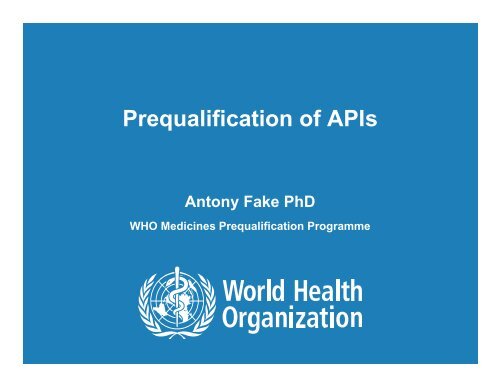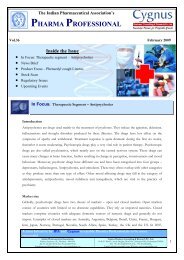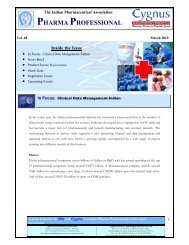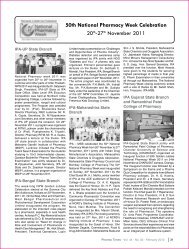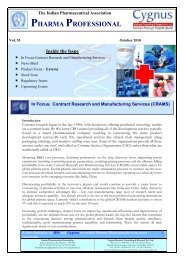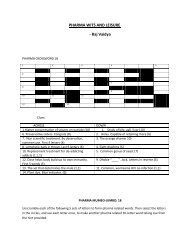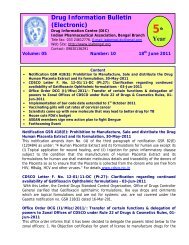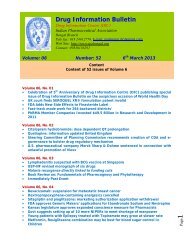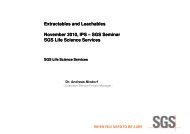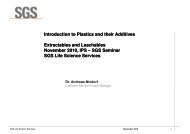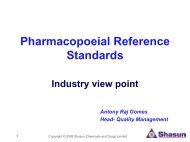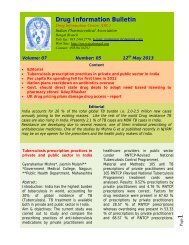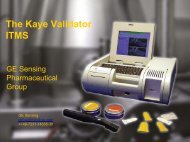Prequalification of APIs - Indian Pharmaceutical Association
Prequalification of APIs - Indian Pharmaceutical Association
Prequalification of APIs - Indian Pharmaceutical Association
Create successful ePaper yourself
Turn your PDF publications into a flip-book with our unique Google optimized e-Paper software.
<strong>Prequalification</strong> <strong>of</strong> <strong>APIs</strong><br />
Antony Fake PhD<br />
WHO Medicines <strong>Prequalification</strong> Programme<br />
1<br />
<strong>Prequalification</strong> <strong>of</strong> <strong>APIs</strong><br />
Mumbai September 2012
2<br />
<strong>Prequalification</strong> <strong>of</strong> <strong>APIs</strong><br />
Mumbai September 2012
Abbreviations<br />
• API – Active <strong>Pharmaceutical</strong> Ingredient<br />
• FPP – Finished <strong>Pharmaceutical</strong> Product<br />
• API PQ – API <strong>Prequalification</strong><br />
• APIMF – Active <strong>Pharmaceutical</strong> Ingredient Master File (DMF)<br />
• CPQ – Confirmation <strong>of</strong> API PQ Document<br />
• SRA – Stringent Regulatory Authority<br />
• GMP – Good Manufacturing Practice<br />
• PQP – <strong>Prequalification</strong> <strong>of</strong> Medicines Programme<br />
<strong>Prequalification</strong> <strong>of</strong> <strong>APIs</strong><br />
Mumbai September 2012
Overview<br />
Outline the API PQ procedure<br />
Updated statistics<br />
API related changes<br />
4<br />
<strong>Prequalification</strong> <strong>of</strong> <strong>APIs</strong><br />
Mumbai September 2012
<strong>Prequalification</strong> <strong>of</strong> Medicines Programme<br />
The <strong>Prequalification</strong> <strong>of</strong> <strong>APIs</strong> is an initiative within the existing<br />
<strong>Prequalification</strong> <strong>of</strong> Medicines Programme.<br />
• <strong>Prequalification</strong> <strong>of</strong> medicinal products.<br />
• <strong>Prequalification</strong> <strong>of</strong> Quality Control Laboratories.<br />
• Capacity building activities.<br />
• <strong>Prequalification</strong> <strong>of</strong> Active <strong>Pharmaceutical</strong> Ingredients.<br />
5<br />
<strong>Prequalification</strong> <strong>of</strong> <strong>APIs</strong><br />
Mumbai September 2012
Two uses <strong>of</strong> APIMFs in PQP<br />
APIMF<br />
Procedure<br />
APIMFs<br />
API<br />
<strong>Prequalification</strong><br />
APIMFs are used to support FPP <strong>Prequalification</strong> and API prequalification.<br />
6<br />
<strong>Prequalification</strong> <strong>of</strong> <strong>APIs</strong><br />
Mumbai September 2012
APIMF Procedure<br />
FPP<br />
Manufacturer<br />
API<br />
Manufacturer<br />
+<br />
AP<br />
RP<br />
+<br />
APIMF assessment is conducted in conjunction with an FPP application<br />
7<br />
<strong>Prequalification</strong> <strong>of</strong> <strong>APIs</strong><br />
Mumbai September 2012
What is API <strong>Prequalification</strong>?<br />
It is a scheme for API manufacturers only<br />
API<br />
<strong>Prequalification</strong><br />
API<br />
Manufacturer<br />
There is no involvement by FPP manufacturers<br />
8<br />
<strong>Prequalification</strong> <strong>of</strong> <strong>APIs</strong><br />
Mumbai September 2012
What is API <strong>Prequalification</strong>?<br />
• It is a scheme for manufacturers <strong>of</strong> <strong>APIs</strong> that are used in medicinal<br />
products for HIV, TB, Reproductive Health and Malaria.<br />
• It seeks to verify and identify <strong>APIs</strong> that are <strong>of</strong> good quality and<br />
manufactured in compliance with GMP.<br />
• It commenced as a pilot project in October 2010.<br />
• It is part <strong>of</strong> the <strong>Prequalification</strong> <strong>of</strong> Medicines Programme, WHO<br />
based in Geneva.<br />
9<br />
<strong>Prequalification</strong> <strong>of</strong> <strong>APIs</strong><br />
Mumbai September 2012
<strong>Prequalification</strong> <strong>of</strong> Medicines website<br />
http://www.who.int/prequal<br />
10<br />
<strong>Prequalification</strong> <strong>of</strong> <strong>APIs</strong><br />
Mumbai September 2012
Why is <strong>Prequalification</strong> <strong>of</strong> <strong>APIs</strong> needed?<br />
• There is a need to identify sources <strong>of</strong> good quality API for use in<br />
medicinal products for HIV, TB, malaria and reproductive health.<br />
• Primarily for use in medicinal products procured by UN agencies and<br />
other international procurers, but<br />
• Also for use in medicinal products procured by countries with limited<br />
regulatory capacity.<br />
11<br />
<strong>Prequalification</strong> <strong>of</strong> <strong>APIs</strong><br />
Mumbai September 2012
Why is <strong>Prequalification</strong> <strong>of</strong> <strong>APIs</strong> needed?<br />
Medicine manufacturers involved in the PQ programme (and in<br />
general) have difficulties in finding sources <strong>of</strong> quality <strong>APIs</strong> for malaria,<br />
HIV, reproductive health and TB, because:<br />
• There is a relative scarcity <strong>of</strong> API.<br />
• There are significant geographical distances between API and FPP<br />
manufacturers, i.e. between China and India.<br />
• The quality <strong>of</strong> the API manufacturer may not be clear.<br />
This creates basic problems for FPP manufacturers to find and<br />
establish contact with potential API manufacturers.<br />
12<br />
<strong>Prequalification</strong> <strong>of</strong> <strong>APIs</strong><br />
Mumbai September 2012
Benefits to API manufacturers<br />
• Recognition as a source <strong>of</strong> quality API, manufactured in compliance<br />
with GMP.<br />
• Serves as a point <strong>of</strong> difference between good quality and poor quality<br />
<strong>APIs</strong>.<br />
• Opportunities to verify compliance with GMP.<br />
• Opportunities to compile, revise and refine their regulatory<br />
documentation, leading to quicker acceptance by other national<br />
regulatory agencies.<br />
• There is no fee.<br />
13<br />
<strong>Prequalification</strong> <strong>of</strong> <strong>APIs</strong><br />
Mumbai September 2012
Benefits to FPP manufacturers<br />
• Ease <strong>of</strong> identifying potential sources <strong>of</strong> quality API.<br />
• Identifying API manufacturers with robust quality systems in place.<br />
• Identifying API manufacturers that maintain good regulatory<br />
documentation, which may be used in regulatory submissions.<br />
• Reduced API assessment requirements (PQP)<br />
• There is no fee.<br />
14<br />
<strong>Prequalification</strong> <strong>of</strong> <strong>APIs</strong><br />
Mumbai September 2012
How are <strong>APIs</strong> Prequalified<br />
Invitation<br />
Application<br />
Assessment<br />
(GMP)<br />
Assessment<br />
(Quality)<br />
Decision<br />
Publishing<br />
15<br />
<strong>Prequalification</strong> <strong>of</strong> <strong>APIs</strong><br />
Mumbai September 2012
3 rd Invitation for EOI<br />
• Not all <strong>APIs</strong> are invited to apply for prequalification.<br />
• <strong>APIs</strong> are publicly invited through a published invitation for expression<br />
<strong>of</strong> interest (EOI).<br />
• A 3 rd invitation for Expressions <strong>of</strong> Interest (EOI) has now been<br />
announced.<br />
• It essentially covers those <strong>APIs</strong> listed in the associated FPP EOIs for<br />
HIV, anti-TB, Malaria, reproductive health neglected tropical<br />
diseases.<br />
• See website for the invitation:<br />
http://www.who.int/prequal/info_applicants/API_info_applicants.htm<br />
16<br />
<strong>Prequalification</strong> <strong>of</strong> <strong>APIs</strong><br />
Mumbai September 2012
3 rd Invitation for EOI<br />
Therapeutic area<br />
HIV<br />
Anti-malarial<br />
Anti-tuberculosis<br />
Invited Active <strong>Pharmaceutical</strong> Ingredient<br />
Abacavir, Atazanavir, Darunavir, Didanosine, Efavirenz, Emtricitabine, Etravirine,<br />
Lamivudine, Lopinavir, Nevirapine, Raltegravir, Ritonavir, Stavudine, Ten<strong>of</strong>ovir,<br />
Zidovudine<br />
Amodiaquine, Artemether, Artesunate, Dihydroartemisinin, Lumefantrine,<br />
Mefloquine, Piperaquine, Pyrimethamine, Sulfadoxine, Pyronaridine<br />
Amikacin, Capreomycin, Cycloserine, Ethambutol, Ethionamide, Isoniazid,<br />
Kanamycin, Lev<strong>of</strong>loxacin, Moxifloxacin, Ofloxacin, Para-Aminosalicylic Acid (PAS),<br />
Prothionamide, Pyrazinamide, Rifampicin, Streptomycin, Terizidone<br />
Reproductive<br />
health<br />
Neglected Tropical<br />
Diseases<br />
Desogestrel, Estradiol, Ethinylestradiol, Etonogestrel, Levonorgestrel,<br />
Medroxyprogesterone, Mifepristone, Misoprostol, Norethisterone, Norgestrel,<br />
Oxytocin<br />
Diethylcarbamazine, Mebendazole<br />
17<br />
<strong>Prequalification</strong> <strong>of</strong> <strong>APIs</strong><br />
Mumbai September 2012
Application<br />
Invitation<br />
Application<br />
Assessment<br />
(GMP)<br />
Assessment<br />
(Quality)<br />
Decision<br />
Publishing<br />
18<br />
<strong>Prequalification</strong> <strong>of</strong> <strong>APIs</strong><br />
Mumbai September 2012
Application<br />
• An application for API <strong>Prequalification</strong> is made by the API<br />
manufacturer, or agent.<br />
• An applicant does not need to be supplying API to a WHO<br />
Prequalified FPP to seek API prequalification.<br />
19<br />
<strong>Prequalification</strong> <strong>of</strong> <strong>APIs</strong><br />
Mumbai September 2012
Application<br />
An application should consist <strong>of</strong>:<br />
• The PQ application form.<br />
• An APIMF (if not previously provided).<br />
• A Site Master File (if not previously provided).<br />
• Any further evidence <strong>of</strong> GMP at the facility (optional).<br />
20<br />
<strong>Prequalification</strong> <strong>of</strong> <strong>APIs</strong><br />
Mumbai September 2012
Assessment – Quality (APIMF)<br />
Invitation<br />
Application<br />
Assessment<br />
(GMP)<br />
Assessment<br />
(Quality)<br />
Decision<br />
Publishing<br />
21<br />
<strong>Prequalification</strong> <strong>of</strong> <strong>APIs</strong><br />
Mumbai September 2012
APIMF submission<br />
There are four options when submitting an APIMF in support<br />
<strong>of</strong> PQ.<br />
Option 1<br />
New APIMF (PQP only)<br />
•A new APIMF, with a unique version number is submitted as<br />
part <strong>of</strong> the application.<br />
22<br />
<strong>Prequalification</strong> <strong>of</strong> <strong>APIs</strong><br />
Mumbai September 2012
APIMF submission<br />
Option 2<br />
The APIMF is intended for API PQ use only.<br />
The technical content <strong>of</strong> the submitted APIMF is the same as the<br />
APIMF submitted for the APIMF procedure and subsequent<br />
amendments.<br />
•A new APIMF is submitted using a version number differing from<br />
that used in APIMF procedure.<br />
•Information in the two APIMFs may diverge over time.<br />
23<br />
<strong>Prequalification</strong> <strong>of</strong> <strong>APIs</strong><br />
Mumbai September 2012
APIMF submission<br />
Option 3<br />
The APIMF is intended for both API PQ and APIMF procedure.<br />
The technical content <strong>of</strong> the submitted APIMF is the same as the<br />
APIMF submitted for the APIMF procedure and subsequent<br />
amendments.<br />
•A new APIMF is submitted using a version number differing from that<br />
used in APIMF procedure.<br />
•The same APIMF will be used in both procedures. It replaces the<br />
existing APIMF used in the APIMF procedure.<br />
24<br />
<strong>Prequalification</strong> <strong>of</strong> <strong>APIs</strong><br />
Mumbai September 2012
APIMF submission<br />
Option 4<br />
No APIMF is provided.<br />
•An existing APIMF already held for the APIMF procedure is<br />
referred to.<br />
•The existing APIMF will be used for API PQ and APIMF procedure<br />
•The existing APIMF must met all current requirements.<br />
25<br />
<strong>Prequalification</strong> <strong>of</strong> <strong>APIs</strong><br />
Mumbai September 2012
APIMF - Technical content<br />
Excellent technical guidance can be found in the module 3.2.S sections<br />
(pages 11 to 31) <strong>of</strong> the recently published guideline :<br />
Guideline on submission <strong>of</strong> documentation for a multisource (generic)<br />
finished pharmaceutical product (FPP): quality part.<br />
http://www.who.int/prequal/info_general/documents/generic_guide/Generi<br />
cGuideline_Quality.pdf<br />
26<br />
<strong>Prequalification</strong> <strong>of</strong> <strong>APIs</strong><br />
Mumbai September 2012
The submitted APIMF should:<br />
•be prepared in CTD format.<br />
APIMF Presentation<br />
•be separated into open (applicant) and closed (restricted) sections.<br />
•be paginated throughout the entire document. Restarting page numbers<br />
for each subsection section is not permitted.<br />
•include a contents page with page number references to each <strong>of</strong> the<br />
CTD subsections.<br />
•be assigned a manufacturer's version number that should be present in<br />
the footer or header <strong>of</strong> each page <strong>of</strong> the APIMF.<br />
27<br />
<strong>Prequalification</strong> <strong>of</strong> <strong>APIs</strong><br />
Mumbai September 2012
APIMF Presentation<br />
The submitted electronic APIMF should:<br />
•have separate files for the open and closed sections.<br />
•single files should not exceed 30 MB in size.<br />
•be provided in text-selectable PDF format.<br />
•have document bookmarks for each <strong>of</strong> the CTD subsections. In<br />
additional the use <strong>of</strong> hyperlinks within the body <strong>of</strong> the text is<br />
encouraged.<br />
•Scanned copies <strong>of</strong> supporting documents such as Certificates <strong>of</strong><br />
Analysis, authorized specifications, signed protocols, etc are<br />
permitted.<br />
28<br />
<strong>Prequalification</strong> <strong>of</strong> <strong>APIs</strong><br />
Mumbai September 2012
Assessment - GMP<br />
Invitation<br />
Application<br />
Assessment<br />
(GMP)<br />
Assessment<br />
(Quality)<br />
Decision<br />
Publishing<br />
29<br />
<strong>Prequalification</strong> <strong>of</strong> <strong>APIs</strong><br />
Mumbai September 2012
Assessment – GMP<br />
There are two ways to demonstrate GMP compliance at the API<br />
manufacturing facility.<br />
• By providing evidence <strong>of</strong> current compliance:<br />
– GMP certificates, inspection reports, CAPAs, the most recently<br />
completed Product Quality Review (PQR) report.<br />
or<br />
• By inspection by the WHO.<br />
30<br />
<strong>Prequalification</strong> <strong>of</strong> <strong>APIs</strong><br />
Mumbai September 2012
Assessment – GMP<br />
Assessment <strong>of</strong> GMP compliance at the site <strong>of</strong> API manufacture takes<br />
into account:<br />
• Inspections performed previously by WHO, a member <strong>of</strong> PIC/S, or an<br />
SRA.<br />
• Inspection must have occurred within 3 years <strong>of</strong> application.<br />
• Inspections must be API specific.<br />
The WHO will perform an inspection if, after assessment and requests<br />
for information, GMP compliance can not be established.<br />
31<br />
<strong>Prequalification</strong> <strong>of</strong> <strong>APIs</strong><br />
Mumbai September 2012
Assessment <strong>of</strong> GMP<br />
An SRA is a medicines regulatory authority in a country that is:<br />
• a member <strong>of</strong> the ICH: Japan, USA, EU member; or<br />
• an ICH Observer, e.g. Swissmedic, Health Canada; or<br />
• associated with an ICH member through a legally binding mutual<br />
recognition agreement, e.g. Australia, Iceland, Liechtenstein,<br />
Norway…etc.<br />
32<br />
<strong>Prequalification</strong> <strong>of</strong> <strong>APIs</strong><br />
Mumbai September 2012
WHO GMP Certificates<br />
There is no such thing. The WHO does not issue GMP Certificates.<br />
• There are many certificates circulating that appear to be issued by the<br />
WHO, but they are not.<br />
• Certificates might be issued in the WHO format, or the inspection may<br />
have occurred against WHO criteria, but this is not a WHO inspection.<br />
• Successful inspections conducted by the WHO are published in<br />
WHOPIR that can be found at this link:<br />
http://www.who.int/prequal/WHOPIR/pq_whopir.htm<br />
33<br />
<strong>Prequalification</strong> <strong>Prequalification</strong> <strong>of</strong> <strong>APIs</strong><br />
<strong>of</strong> <strong>APIs</strong><br />
1 October 2011, Mumbai Malaysia<br />
September 2012
Decision<br />
Invitation<br />
Application<br />
Assessment<br />
(GMP)<br />
Assessment<br />
(Quality)<br />
Decision<br />
Publishing<br />
34<br />
<strong>Prequalification</strong> <strong>of</strong> <strong>APIs</strong><br />
Mumbai September 2012
Decision<br />
• Once the APIMF is accepted the applicant will receive an Letter <strong>of</strong><br />
APIMF acceptance. This is not prequalification.<br />
• Typically a final conclusion over GMP status may still be required, if<br />
this has not been achieved already.<br />
• Once both the APIMF and GMP status is accepted the application<br />
is considered for sign-<strong>of</strong>f.<br />
• The applicant will be contacted by WHO to confirm final details for<br />
publishing. Expressions <strong>of</strong> storage statement may differ to meet<br />
WHO requirements.<br />
35<br />
<strong>Prequalification</strong> <strong>of</strong> <strong>APIs</strong><br />
Mumbai September 2012
Publishing<br />
Invitation<br />
Application<br />
Assessment<br />
(GMP)<br />
Assessment<br />
(Quality)<br />
Decision<br />
Publishing<br />
36<br />
<strong>Prequalification</strong> <strong>of</strong> <strong>APIs</strong><br />
Mumbai September 2012
Publishing<br />
List <strong>of</strong> PQ <strong>APIs</strong><br />
Website (Public)<br />
+ WHOPIRs<br />
Website (Public)<br />
Confirmation Document (Private)<br />
37<br />
<strong>Prequalification</strong> <strong>of</strong> <strong>APIs</strong><br />
Mumbai September 2012
Publishing<br />
The date <strong>of</strong> prequalification is the date when the API is published on the<br />
WHO List <strong>of</strong> Prequalified Active <strong>Pharmaceutical</strong> ingredients.<br />
http://www.who.int/prequal/info_applicants/API_PQ-List.htm<br />
38<br />
<strong>Prequalification</strong> <strong>of</strong> <strong>APIs</strong><br />
Mumbai September 2012
WHO List <strong>of</strong> Prequalified <strong>APIs</strong><br />
Publically available<br />
• WHO application number.<br />
• INN name.<br />
• Date <strong>of</strong> prequalification.<br />
• Name <strong>of</strong> the applicant<br />
• Sites <strong>of</strong> API manufacture.<br />
• The APIMF version number.<br />
• The API specification version<br />
number.<br />
• The primary and secondary<br />
packaging components.<br />
• The assigned re-test period.<br />
• The recommended storage<br />
conditions.<br />
• Confirmation <strong>of</strong> API PQ<br />
document issue date<br />
Intended for: UN agencies, National medicine authorities, FPP manufacturers, public<br />
39<br />
<strong>Prequalification</strong> <strong>of</strong> <strong>APIs</strong><br />
Mumbai September 2012
Confirmation <strong>of</strong> API PQ document<br />
Provided to the API manufacturer for distribution at their<br />
discretion<br />
• The assigned WHO application number.<br />
• The INN name <strong>of</strong> the active pharmaceutical ingredient.<br />
• API manufacturer company name.<br />
• The API specification version number.<br />
• A copy <strong>of</strong> the API specifications.<br />
• The assigned re-test period.<br />
• The recommended storage conditions.<br />
• A copy <strong>of</strong> the assay and related substances test methods.<br />
Intended for: UN agencies, National medicine authorities, FPP manufacturers<br />
40<br />
<strong>Prequalification</strong> <strong>of</strong> <strong>APIs</strong><br />
Mumbai September 2012
API-PQ Procedure<br />
+<br />
API<br />
Manufacturer<br />
FPP<br />
Manufacturer<br />
<strong>Prequalification</strong> <strong>of</strong> <strong>APIs</strong><br />
Mumbai September 2012
Confirmation <strong>of</strong> API PQ document (CPQ)<br />
It is intended that the CPQ is circulated to relevant parties, such as<br />
FPP manufacturers.<br />
Wider recognition <strong>of</strong> API-PQ is a long term goal.<br />
Manufacturers <strong>of</strong> a PQ’d API currently participating in the APIMF<br />
procedure should circulate the CPQ to associated FPP<br />
manufacturer’s.<br />
Normally the FPP manufacturer will then submit the CPQ and<br />
withdraw from the APIMF procedure.<br />
FPP manufacturers need to actively request this change.<br />
This will have post-<strong>Prequalification</strong> benefits in terms <strong>of</strong> the number <strong>of</strong><br />
variations they will need to file.<br />
42<br />
<strong>Prequalification</strong> <strong>of</strong> <strong>APIs</strong><br />
Mumbai September 2012
API <strong>Prequalification</strong> Performance<br />
1 April 2011<br />
1 November 2011<br />
1 Sept 2012<br />
Total number <strong>of</strong><br />
applications<br />
8<br />
29<br />
62<br />
Number <strong>of</strong> PQ <strong>APIs</strong><br />
2<br />
5<br />
18<br />
• There is positive feedback from FPP manufacturers whenever PQ <strong>of</strong><br />
<strong>APIs</strong> is discussed.<br />
• Applications and the number <strong>of</strong> prequalified <strong>APIs</strong> continues to<br />
increase.<br />
43<br />
<strong>Prequalification</strong> <strong>of</strong> <strong>APIs</strong><br />
Mumbai September 2012
API <strong>Prequalification</strong> Performance<br />
<strong>APIs</strong> have been prequalified for HIV (2), Malaria (15), and TB (4).<br />
8 manufacturers have successfully PQ’d one or more <strong>APIs</strong>:<br />
•Anuh Pharma Ltd (1)<br />
•Calyx Chemicals & <strong>Pharmaceutical</strong>s Ltd (4)<br />
•Ipca Laboratories Ltd (3)<br />
•Laurus Labs Pvt Ltd (2)<br />
•Lupin Ltd (1)<br />
•Mangalam Drugs & Organics Ltd (7)<br />
•Mylan Laboratories Ltd (1)<br />
•Sequent Scientific Ltd (2)<br />
44<br />
<strong>Prequalification</strong> <strong>of</strong> <strong>APIs</strong><br />
Mumbai September 2012
Changes to API Details<br />
Changes to API details must be announced to the PQP.<br />
There are two phases to this process<br />
1.The APIMF holder submits an amendment to PQP for the change.<br />
2.Prequalified FPP manufacturers submits a variation to PQP for the change.<br />
This is placing an increasing burden on both PQP and manufacturers.<br />
This is true for API manufacturers using the APIMF procedure<br />
or a Prequalified API<br />
45<br />
<strong>Prequalification</strong> <strong>of</strong> <strong>APIs</strong><br />
Mumbai September 2012
Changes to API Details<br />
The proposed PQP guidance on the submission <strong>of</strong> variations in<br />
support <strong>of</strong> Prequalified FPP was circulated this year for comment<br />
and is in the final stages <strong>of</strong> drafting.<br />
This guidance refers in many cases to the submission and<br />
acceptance <strong>of</strong> APIMF amendments.<br />
It also introduces the use <strong>of</strong> CPQ documentation<br />
46<br />
<strong>Prequalification</strong> <strong>of</strong> <strong>APIs</strong><br />
Mumbai September 2012
Changes to API Details<br />
The Variation Guidance being finalised proposes that:<br />
FPP manufacturers using a Prequalified API will only submit a<br />
variation if a new Confirmation <strong>of</strong> API PQ document is issued.<br />
“…Similarly, when an FPP relies upon a CEP or a Prequalified API, FPP<br />
applicants are required to notify WHO PQP only when the associated CEP or<br />
Confirmation <strong>of</strong> API <strong>Prequalification</strong> document has been revised…”<br />
This is a distinct advantage for FPP manufacturers.<br />
47<br />
<strong>Prequalification</strong> <strong>of</strong> <strong>APIs</strong><br />
Mumbai September 2012
48<br />
<strong>Prequalification</strong> <strong>of</strong> <strong>APIs</strong><br />
Mumbai September 2012
Current focus:<br />
Improving the API PQ process<br />
•The introduction <strong>of</strong> the FPP Variation and APIMF Amendment<br />
guidance.<br />
•Introduction <strong>of</strong> mandatory documentation requirements.<br />
•Reduction <strong>of</strong> assessment backlogs<br />
Next:<br />
Discontinuation <strong>of</strong> paper submissions.<br />
Wider recognition and use <strong>of</strong> CPQs in national authorities.<br />
However! Feedback on how the assessment process can be<br />
improved and API PQ value enhanced are welcome at any time.<br />
49<br />
<strong>Prequalification</strong> <strong>of</strong> <strong>APIs</strong><br />
Mumbai September 2012
Further information<br />
The PQ website is a good source <strong>of</strong> information, please read.<br />
http://www.who.int/prequal/info_applicants/API_info_applicants.htm<br />
AND, ALSO<br />
Please email me (or visit) if you have any questions.<br />
Fakea@who.int<br />
One email could save you a lot <strong>of</strong> time.<br />
50<br />
<strong>Prequalification</strong> <strong>of</strong> <strong>APIs</strong><br />
Mumbai September 2012


